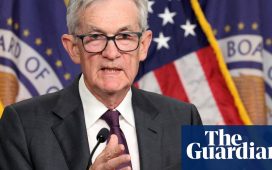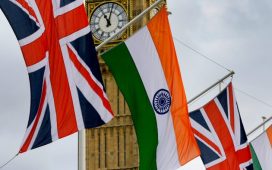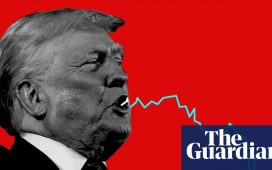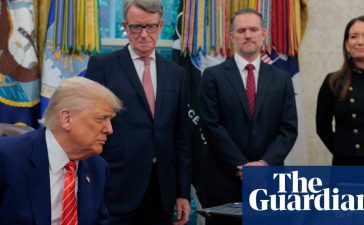
The Magic Mountain, Thomas Mann’s classic novel set in Davos against the backdrop of a deadly disease and an impending world war, was published almost a century ago.
But, as World Economic Forum delegates gather again in Davos this year, Mann’s world feels uncomfortably close to our own. The fear haunting the WEF is that a long period of peace, prosperity and global economic integration could be coming to a close — just as it did in 1914.
This year’s Davos slogan is “Cooperation in a fragmented world”. That fragmentation began with Covid-19 — with its lockdowns, closed borders and disrupted supply chains. So, the 2023 WEF — the first to take place in its regular winter location since the pandemic began — could be seen as signalling a return to normalcy. However, China’s sudden abandonment of its zero-Covid policy has raised fears that a new wave of variants could emerge.
And, even if a fresh pandemic phase is avoided, Covid has left its mark on the way governments and businesses think about globalisation. The assumption that goods and commodities can always be shipped easily around the world has been shattered.
Businesses have moved from ‘just-in-time’ supply chain strategies to ‘just-in-case’. Further global health emergencies are possible. Other scenarios — once deemed remote eventualities — are in sharper focus. Extreme weather events are becoming more frequent, which raises questions about food security and travel. Cyber attacks, by states or criminals, threaten the infrastructure on which the modern economy relies.
Often prompted by governments, businesses are having to change their ways. It is not wise to rely on complex supply chains vulnerable to disease, war or other emergencies. Companies such as Apple — which boasted of products “designed in California, assembled in China” — are having to diversify production. Apple increasingly also produces in India and Vietnam.
Efforts by some western companies to lessen their dependence on China were prompted by the pandemic, but they have since accelerated because of a heightened awareness of geopolitical risk — otherwise known as war.
Russia’s invasion of Ukraine last year demonstrated that the unthinkable can happen. Europe’s biggest war since 1945 is being fought less than a thousand miles from the luxurious hotels of Davos.
With the conflict in Ukraine still raging, the risk of escalation remains high. Nuclear war is the most frightening potential development — and one that has concerned the White House since the outbreak of fighting last February. Even if the use of nuclear weapons is avoided, the danger of widening conflict remains as Nato sends advanced weaponry to Ukraine and Iran supplies Russia with military drones.
The conflict has shown how war can sever the economic ties on which globalisation was built. The EU is drastically reducing imports of Russian energy — fuelling inflation in Europe and threatening to make some industries uncompetitive. Russia and Ukraine are also important suppliers of grain to world markets. Their war has increased food prices and threatened to push millions of people into hunger.
Politicians and industrialists are scanning the horizon for the next big geopolitical threat. Many have focused on Taiwan, which produces 90 per cent of the world’s most advanced semiconductors. A Chinese invasion of Taiwan might shut down TSMC, the most important semiconductor producer, with devastating results for the world economy.
Even geopolitical tensions that stop well short of war have disrupted international commerce. The increasingly wary US attitude to China has led the Biden administration to sharply restrict exports of sensitive technology there. This affects not just US companies, but also foreign technology giants, such as South Korea’s Samsung, that use US tech.
Political leaders, particularly in the west, must worry, too, about domestic pressure from populists. Many of the latter have made the WEF a symbol of inequality and rootless international capitalism.
In recent years, Davos has attracted the ire of anti-vaxxers, climate change sceptics, religious zealots, and hardline nationalists. The forum features in a range of conspiracy theories. On the wilder internet fringes, the WEF has been accused of using the pandemic to seize control of the world economy.
Such theories aside, the idea that Davos is faintly toxic has gained ground. President Joe Biden, determined to present himself as fighting for ordinary working Americans, is unlikely to risk an appearance at Davos — unlike Donald Trump, who enjoyed rubbing shoulders with the assembled CEOs.
Even centrist and conservative leaders in Europe may be cautious about coming.
President Emmanuel Macron of France, a defender of globalisation who has spoken at Davos in the past, has a sensitive domestic pension reform to push through, so may decide that now is not the right time to attend the WEF. As a new British prime minister, and one with a finance background, Rishi Sunak would normally be expected to seize the opportunity to woo the world’s most powerful chief executives. But the UK faces a wave of strikes, so he too will probably decide that it would be wise to miss Davos this year.
Those world leaders who are present might do well to take the funicular up to the Schatzalp Hotel, which served as Mann’s model for the sanatorium in The Magic Mountain. The hotel’s view is the best in Davos — it may offer a chance for quiet reflection on how to prevent war and natural disaster from once again engulfing the global economy.










